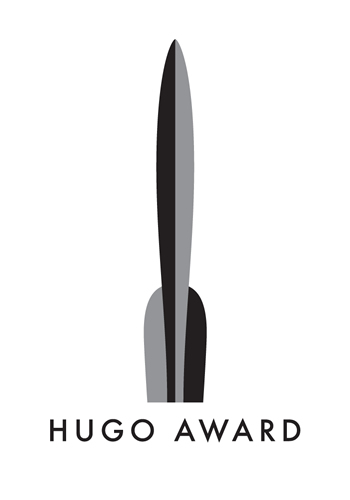 Moving up the list of literary length, I’m transitioning from the Hugo-nominated novelettes to the Hugo-nominated novellas. Let’s start at the bottom:
Moving up the list of literary length, I’m transitioning from the Hugo-nominated novelettes to the Hugo-nominated novellas. Let’s start at the bottom:
6. “The Chaplain’s Legacy” by Brad Torgersen.
This is an astonishingly bad story.
It literally opens with multiple pages of hamfisted “As you know, Bob” exposition. My favorite part of this incredibly lengthy sequence is, “As you know, Bob, you’re the one who brokered the original cease-fire with the horrible aliens.” I was really hoping the response to that would be, “Well, gosh, I’d plumb forgot that, Bobette! Thank goodness you reminded me!” Instead, the actual response is, “As you know, Bobette, I managed to convince the aliens that human religion was such a fascinating mystery that they shouldn’t wipe us out until they understood it.”
And thus we come to the central premise of the story: The aliens are genetically incapable of experiencing “faith” in anything they can’t directly observe or scientifically prove. (There are several problems with that, but let’s ignore them.) During the previous war, a human prisoner of war (our main character) realized that the alien scientists studying them were really interested in the concept of “religion” and managed to negotiate a ceasefire in exchange for teaching them about it. (This is fairly flimsy and is never really locked down with the kind of specificity required to make it seem in any way believable, but let’s ignore that, too.)
Where the story completely falls apart into silliness is when it’s revealed that the aliens refuse to talk to anyone about religion except the main character: Scholars and religious leaders and actual experts are offered, but the aliens refuse to talk to them. Okay, I’ll assume there’s some sort of hand-wavey “this is the way of the aliens” thing going on (although Torgersen never bothers to perform the hand-wave), but it gets even worse when it’s revealed that humanity itself has completely ignored this guy — the linchpin of human survival — for decades. And then it gets completely absurd when we learn that this guy is pretty much completely ignorant about religion and refuses to educate himself about religion in any way.
This final point might, in some way, be defensible if this was a story about this guy’s bullheaded stubbornness and ignorance. But, incredibly, that’s not the story: Instead we’re told repeatedly (and ad nauseum) that this guy will “do anything to finish the job, even if it means disobeying orders.” Apparently “anything” doesn’t include doing the one thing that might let you succeed at your job.
While this incredible sequence of baffling exposition is tumbling out through turgid and repetitive prose (the second scene literally consists of the exact same exposition as the first scene being delivered through a slightly different set of characters exchanging “as you know, Bob” witticisms), the actual plot of the story is slowly unfolding. And it is equally hilarious: The humans have managed to reverse engineer some of the alien technology and have rebuilt some of their infrastructure from the previous war. If they have enough time they might be able to level the playing field, but they know that if fresh hostilities break out that they’re seriously, seriously screwed.
So the humans decide it would be a great idea to start the war themselves by assassinating the alien leader at a peace conference.
You might think that would be the nadir of the story, but no: You still haven’t gotten to the part where the main characters try to outrun spaceships on foot.
Grade: F
5. “Wakulla Springs” by Andy Durance and Ellen Klages.
“Wakulla Springs” is a beautiful, haunting, multi-generational story rich in atmosphere and character and subtle drama. It is easily the best-written and possibly the most entertaining novella nominated for the Hugo Award this year.
It also isn’t speculative fiction.
So while I highly recommend that everyone reading this take some time out of their day to read it over at Tor.com; to savor all of its rich complexities; to luxuriate in its soft warmth; to swim through its crystal clear prose; to twist painfully in its easy evocation of a primitive and savage age… Ultimately I’m constrained by the same standard I confronted with “If You Were a Dinosaur, My Love” in the short story category: This story fundamentally doesn’t qualify for the award, and therefore I’m forced to rank it here.
Grade: A
4. NO AWARD
3.”Six-Gun Snow White” by Catherynne M. Valente
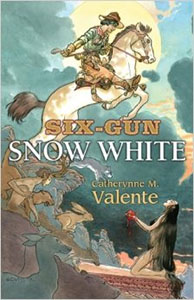 While reading “Six-Gun Snow White” I kept waiting for the other shoe to drop and for the story to reveal some incredibly clever (and hidden) dimension which would transform it into a mind-blowing experience. But… the shoe never drops. This is a story which fundamentally asks, “What if Snow White was a Native American girl who… I dunno… had a gun?” And then reveals that the answer is, “She would be a Native American girl who has a gun.”
While reading “Six-Gun Snow White” I kept waiting for the other shoe to drop and for the story to reveal some incredibly clever (and hidden) dimension which would transform it into a mind-blowing experience. But… the shoe never drops. This is a story which fundamentally asks, “What if Snow White was a Native American girl who… I dunno… had a gun?” And then reveals that the answer is, “She would be a Native American girl who has a gun.”
There’s just something lacking in it.
This simplistic reading of the story, however, does it a fair share of disservice. The reason I was waiting to have my mind blown is because Valente’s storytelling is incredibly complex, her prose is richly compelling, her fantastical imagery is richly evocative, and her exploration of character is heart-wrenching. Valente is also doing some really fascinating deconstruction work on the underlying fairy tale and using it to inject immense depth and breadth into her characters.
In short, it’s a great story and it is told with precision and skill. It just never quite reaches the point of critical mass necessary for the scintillating fission it holds out with a tantalizing and yet ultimately unfulfilled promise.
Grade: B-
2. “Equoid” by Charles Stross
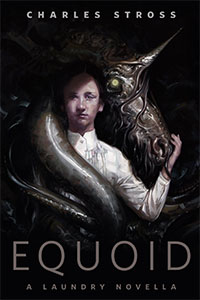 Charles Stross writes great and imaginative stuff and he writes it faster than I can keep up with it.
Charles Stross writes great and imaginative stuff and he writes it faster than I can keep up with it.
“Equoid” is part of his Laundry series, featuring a mid-level employee of the British intelligence service dedicated to dealing with the hidden realities of the Mythos. Previous entries in the series generally take a fascinating and original spin on the Lovecraftian Mythos and hybridize it with a satire or homage of a popular thriller or spy novelist (Len Deighton in The Atrocity Archive; Ian Fleming with The Jennifer Morgue; and so forth).
“Equoid” follows the same model by unveiling an incredibly clever and utterly creepy Lovecraftian interpretation of unicorns and then crosses that with a satire of… H.P. Lovecraft.
And that combination doesn’t quite work. Partly for the same reason that Woody Allen’s Casino Royale or Paul Verhoeven’s Starship Troopers fall flat (trying to satirize a creator with their own work is problematic at best), but also because it seems somewhat mean-spirited to write a series of bestselling novels on the foundation of Lovecraft’s work and then write a story where you literally call him a hack. When you’re standing on the shoulders of giants you shouldn’t unzip your trousers and start pissing on the giants.
I don’t even really think that Stross intends for the story to come off this way, but I’ve read it twice now and the bad vibe it has really takes the shine off.
With that being said, Stross’ conception of the unicorn is awesome. And the plot races forward in a careless careen of headlong excitement. So I still recommend it.
Grade: B
1. “The Butcher of Khardov” by Dan Wells
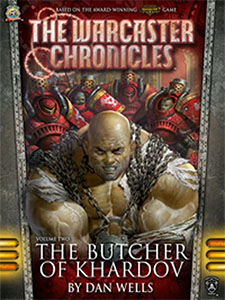 When I first scanned the list of nominees for Best Novella, I’ll admit that the WarMachine tie-in fiction was the last story I expected to top my list. But here it is.
When I first scanned the list of nominees for Best Novella, I’ll admit that the WarMachine tie-in fiction was the last story I expected to top my list. But here it is.
And the reason it’s here is because “The Butcher of Khardov” is just a fantastic piece of fantasy fiction: Wells centers his story around the biography of a strong central character and then presents the tightly plotted arc of the character through a cleverly constructed non-linear narrative that cranks up the dramatic stakes.
It should be noted, perhaps, that I am not personally well acquainted with the WarMachine universe, so the milieu of this story really had to live or die on its own merits. And it thrives. The fantasy elements are interesting, the depth of the setting is leveraged to also create a sense of distance within the character’s own timeline, and the day-to-day life of the inhabitants is vividly transmitted through the page.
Grade: B+
Hugo Reviews 2014 – Part 4: Best Dramatic Presentation (Short Form)

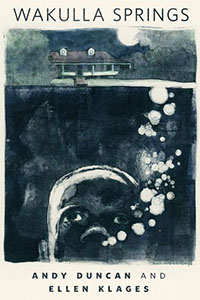











Your description of ”Six-Gun Snow White” reminded me of a juvenile graphic novel I read a while back called “Rapunzel’s Revenge”, which likewise reinvents the title character and places her in a Western milieu. The difference being that it’s not the historical Wild West, but a fictional setting with a Western feel. It’s a fun read. There’s also a sequel, which I haven’t read yet, entitled “Calamity Jack”.
Here’s a review: http://www.lookingglassreview.com/html/rapunzel_s_revenge.html
What criteria do you consider when determining whether a work is speculative fiction? I know it’s a topic of some discussion, and since it’s come up twice now in your reviews I’m curious how you approach it.
Check out Definitions of Speculative Fiction.
“Wakulla Springs” is borderline: There’s a scene with a talking animal, but then the person who thinks they see the animal talking wakes up and concludes it was a dream. And then the very last sentence of the story invokes a creature of fantasy. If you assume that the talking animal was really talking or if you pair the fantasy creature with an off-hand reference earlier in the story and squint really, really hard you can kinda, sorta make it an SF story if you clap your hands together hard enough.
“If You Were a Dinosaur, My Love” (which I discuss over here), on the other hand, would be more appropriately entitled “If You Were a Dinosaur, My Love, Then This Would Be an SF Story, But You’re Not So This is Actually Just a Metaphor”.
[…] Hugo Reviews 2014 – Novellas (thealexandrian.net) […]